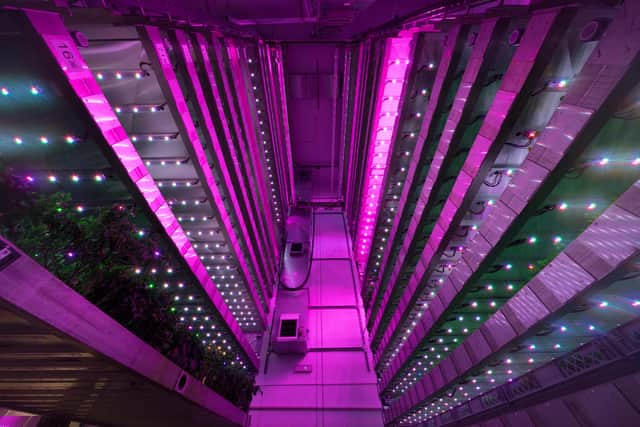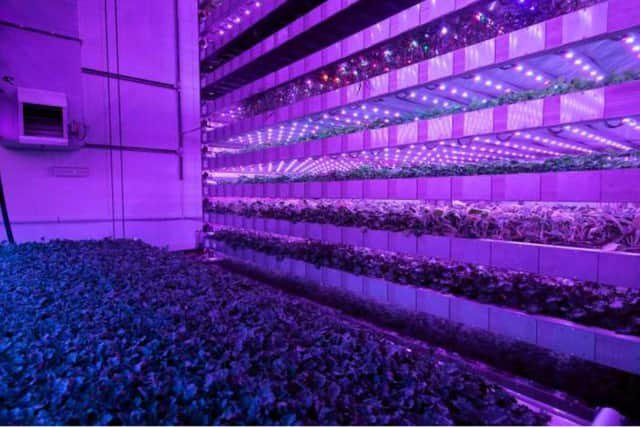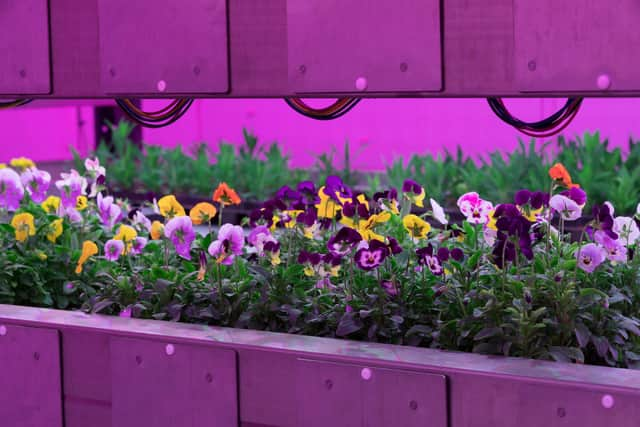COP26: Scottish firm to showcase future of food growing at pop-up vertical farm in Glasgow city centre
Intelligent Growth Solutions (IGS) has invested £500,000 in a state-of-the-art pop-up vertical farm and education centre in the city to allow locals, school children and visitors to see first-hand what agriculture of the future could look like.
The firm is also trialing a wide range of crops that can be grown in a vertical farm, helping to feed the world, boost rewilding and battle climate change.
Advertisement
Hide AdAdvertisement
Hide AdVertical farming is the practice of growing crops indoors in upright stacked layers.
The concept was first developed by Nasa scientists as a potential way to grow food for astronauts in space.
It often incorporates controlled-environment agriculture, which aims to optimise plant growth, and soil-less techniques such as hydroponics, aquaponics and aeroponics.
The Edinburgh-based start-up firm, which was established in 2013, launched its first demonstration farm in 2018 at the Dundee campus of the James Hutton Institute after having invested around £7 million in research and development.


The IGS team has developed breakthrough technologies and methods that are set to revolutionise the emerging sector.
IGS founder and chief executive David Farquhar says vertical farming has come a long way since its inception, when it was inefficient, expensive, labour-intensive and limited in scope.
Since the beginning of the coronavirus pandemic, IGS has seen sales go from zero to £40 million and its staff expand from 25 individuals to more than 140 over the past 18 months.
The company works with farmers, entrepreneurs, consumer food businesses, pharmaceuticals and governments and is now supplying its modular growing units across four continents.


Advertisement
Hide AdAdvertisement
Hide AdVertical farming provides solutions to some of the biggest problems facing agriculture in the future, according to Mr Farquhar.
Firstly, the indoor farms can be located virtually anywhere, without a need for arable land – whether that’s in cities or deserts, brownfield sites or docksides – and require only a fraction – one hundredth – of the amount of space for an equivalent outside growing area.
There are also major environmental benefits, with the ability to achieve zero climate emissions.
Controlled indoor conditions mean no pesticides are needed to grow crops and they are not exposed to outdoor air pollution so produce doesn’t need to be washed before being eaten.


Cultivation can be powered by 100 per cent renewable energy; food miles and waste can be cut if farms are located near the people they supply; water consumption is low compared to traditional growing method – where 250 litres is needed in a field, this drops to 20 litres for a greenhouse or just one litre in a vertical farm.
Mr Farquhar believes vertical farms will have an increasingly important part to play in feeding the world’s rapidly expanding population – predicted to reach 10 billion people by 2050 – especially as climate change increasingly affects the reliability of food production.
“To feed everyone we will need to grow more food in the next 30 years than we have grown in the previous 10,000 years,” he said.
“That’s a shocking figure.
“Most people don’t realise how broken our food system is.
“Climate change is now being driven by agriculture more than anything else.
“The way we grow our food need to change dramatically
“We really do need to clean up our act.
“At IGS we are working with farmers, not against them.”
Advertisement
Hide AdAdvertisement
Hide AdVertical farms were once able to grow only leafy greens and herbs but IGS is already successfully rearing the likes of seed potatoes, avocados, peppers, soft fruit, carrots and radishes, edible flowers and botanicals for gin distilleries and perfumiers, broccoli and cauliflower starter plants and even hardwood tree saplings that will be used in rewilding and conservation projects in Scotland.
The team has plans to explore other, more exotic crops – including saffron and vanilla – in response to interest from farmers.
IGS is encouraging people to see what’s happening at its exhibition in Glasgow, located at the Sustainable Glasgow Landing site in Broomielaw, and get a close-up view of a 5.4m-high operational vertical farm.
Free tours and educational resources are available for all school groups.
The facility is open throughout the duration of COP26, from 1 to 12 November.
A message from the Editor:
Thank you for reading this article. We’re more reliant on your support than ever as the shift in consumer habits brought about by coronavirus impacts our advertisers.
If you haven’t already, please consider supporting our trusted, fact-checked journalism by taking out a digital subscription.
Comments
Want to join the conversation? Please or to comment on this article.
